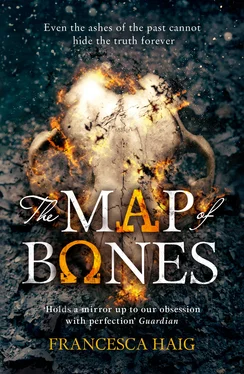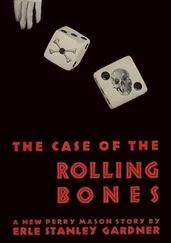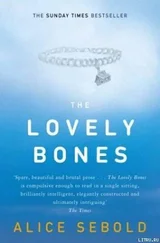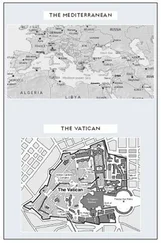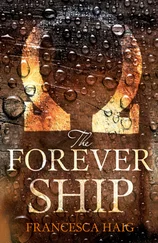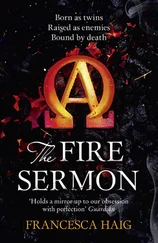Even when Eva had settled down to rest, Leonard kept working, adding the words now. He sang slowly, trying out different versions of the words. He was stringing them onto the growing melody like beads on a string, sometimes unthreading and rearranging. When Piper relieved me at the lookout post, I fell asleep listening to Leonard’s singing, the gravelled edge of his deep voice.
When I woke later, the moon was rising in the darkening sky, and Leonard was still playing. I walked down to the spring. The music followed me all the way to the water, which might be why Zoe didn’t hear me coming. I saw her standing close to where the stream burst from the rock, about twenty feet ahead of me. She was leaning against a tree, one arm wrapped loosely around it, her head resting on the trunk as she tilted her face upwards. She swayed slightly to the music that filtered through the trees. Her eyes were closed.
I’d seen Zoe naked, when we washed at rivers. I’d seen her asleep. I’d even shared her dreams, her sleeping mind a window onto the sea. But I’d never seen her as unguarded as at that moment. I turned away, as if I’d seen something shameful, and began to retreat. She opened her eyes.
‘Are you spying on me?’
‘Just fetching water,’ I said, lifting the empty water flask like a flag of surrender.
She turned back to the spring. When she spoke, she didn’t look at me. ‘There used to be a bard who came through our parents’ village, a few times a year. She played the violin like nobody you’ve ever seen. Piper and I were only tiny, then – we used to sneak out after bedtime to listen.’
She said nothing more. I hesitated before speaking – I was remembering her blade at my stomach, after she’d learned that I’d seen her dreams.
‘If you want to talk –’ I said, eventually.
‘You’re meant to be the expert on the future,’ she interrupted, striding towards me and grabbing the flask. ‘Concentrate on that. That’s what we need you for. Keep your nose out of my past.’ She knelt at the spring and wrenched the stopper out before filling the flask.
We stood facing each other. I watched the water drip from her wet hand, and I tried to come up with words that she couldn’t throw back at me.
Before I could speak, the music stopped suddenly. From up the hill, Piper was calling to us. Zoe strode past me and didn’t look back.
‘The song’s not finished yet,’ Leonard warned us, when we were gathered around him and Eva. A fog had descended with the darkness, and Piper had rekindled the fire. ‘It’ll change, too,’ he added, ‘as we travel, and as other bards take it up. If a song’s alive enough, it changes.’ I remembered the different versions of songs that I’d heard. The song about the blast, which changed from bard to bard, or from season to season.
Leonard began quietly, his fingers strumming a series of almost cheerful chords on the guitar. There was none of the intricate fingerpicking that had impressed me when he’d performed for us earlier. ‘I’ve kept it simple,’ he said, as if he could see me staring at his fingers. ‘If you want it to catch on, it has to be something that any bard could play, without fifteen fingers.’
As the tune went on, melancholy notes were slipped in like contraband, so that by the time they reached the chorus, the tune had soured. Eva’s melody parted from Leonard’s, her voice climbing to new and mournful highs, as his stayed steady and low. Their voices counterbalanced and resonated, until the space in between the notes was thick with longing.
There’s no refuge in the refuge,
No peace behind those gates.
No freedom once you turn to them
Just living death, where the tanks await.
They throw you in a cage of glass
Not living, and not dying.
Trapped inside a floating hell
Where none can hear you crying.
Oh, you’ll never be hungry, you’ll never be thirsty
And the Council’s tanks will have no mercy.
Oh, you’ll never be tired, you’ll never be cold
And you’ll never ever ever grow old,
And the only price you’ll have to pay
Is to give your life away.
They drive us to the blighted land
Then bleed us with their tithes,
And if you go to the refuge
They’ll take your very lives.
The taboo has been forsaken
Within the refuge walls.
The machines have been awakened
And the Council plans to tank us all.
Oh, you’ll never be hungry, you’ll never be thirsty
And the Council’s tanks will have no mercy.
Oh, you’ll never be tired, you’ll never be cold
And you’ll never ever ever grow old,
And the only price you’ll have to pay
Is to give your life away.
When Leonard and Eva had played for us in the morning, we’d whooped along with some of the fast jigs, and clapped after some of the pieces where Leonard’s fingers had been at their swiftest. But none of us clapped now. The last notes slipped away, between the trees that encircled us like a gathered crowd. Our silence was the song’s best testament.
I wanted to send something into the world that wasn’t fire, or blood, or blades. Too many of my actions in recent months were bloodstained. The song was different – it was something we had built, rather than destroyed. But I knew that it was still a risk. If Leonard was caught, the song would hang him as surely as any act of violent resistance would. If Council soldiers heard him sing, or traced the treason back to him, the song would wind itself around his neck sure as a noose, and it would be his dirge, and Eva’s. Their twins’, too.
‘It’s a brave thing that the two of you’re doing,’ I said to Leonard, as we were packing up the camp in the dark.
He scoffed. ‘People fought and bled, on the island. I’m just an old blind man with a guitar.’
‘There are different kinds of courage,’ said Piper, emptying a flask of water on the fire, to ensure no telltale embers remained.
We said farewell to Leonard and Eva when we reached the road. A quick pressing of hands in the dark, and they were gone, heading east while we went west. Leonard was playing his mouth organ again, but distance rapidly dampened the music.
Over the next few days I found myself humming the chorus as I sharpened my dagger, matching the blade’s rasp to the beats of the song. I whistled the tune as I gathered wood for the fire. It was only a song, but it took hold in my mind like the ragweed that used to take over my mother’s garden.
I’d never seen anything like the Sunken Shore. When we arrived, after five nights of walking, it was dawn. Below us, it looked as if the sea had crept gradually inwards, the land surrendering in messy increments. There was no clear point where the sea met the land, like in the steep cliffs that Kip and I had seen on the south-west coast, or even in the coves near the east coast’s Miller River. Instead there was only a jumble of peninsulas and spits, divided by inlets that grasped inland like the sea’s fingers. In some places, the land petered out into swampy shallows before giving in entirely to the sea. Elsewhere, low islands were humped with straggled grey-green growth that might have been grass or seaweed.
‘It’s low-tide now,’ Piper said to me. ‘Half of those islands will be under by noon. The shallows of the peninsulas too. If you get caught out on the wrong spit of land when the tide turns, you can find yourself in trouble.’
‘How does Sally live here? They haven’t allowed Omegas to live on the coast for years.’
Читать дальше
